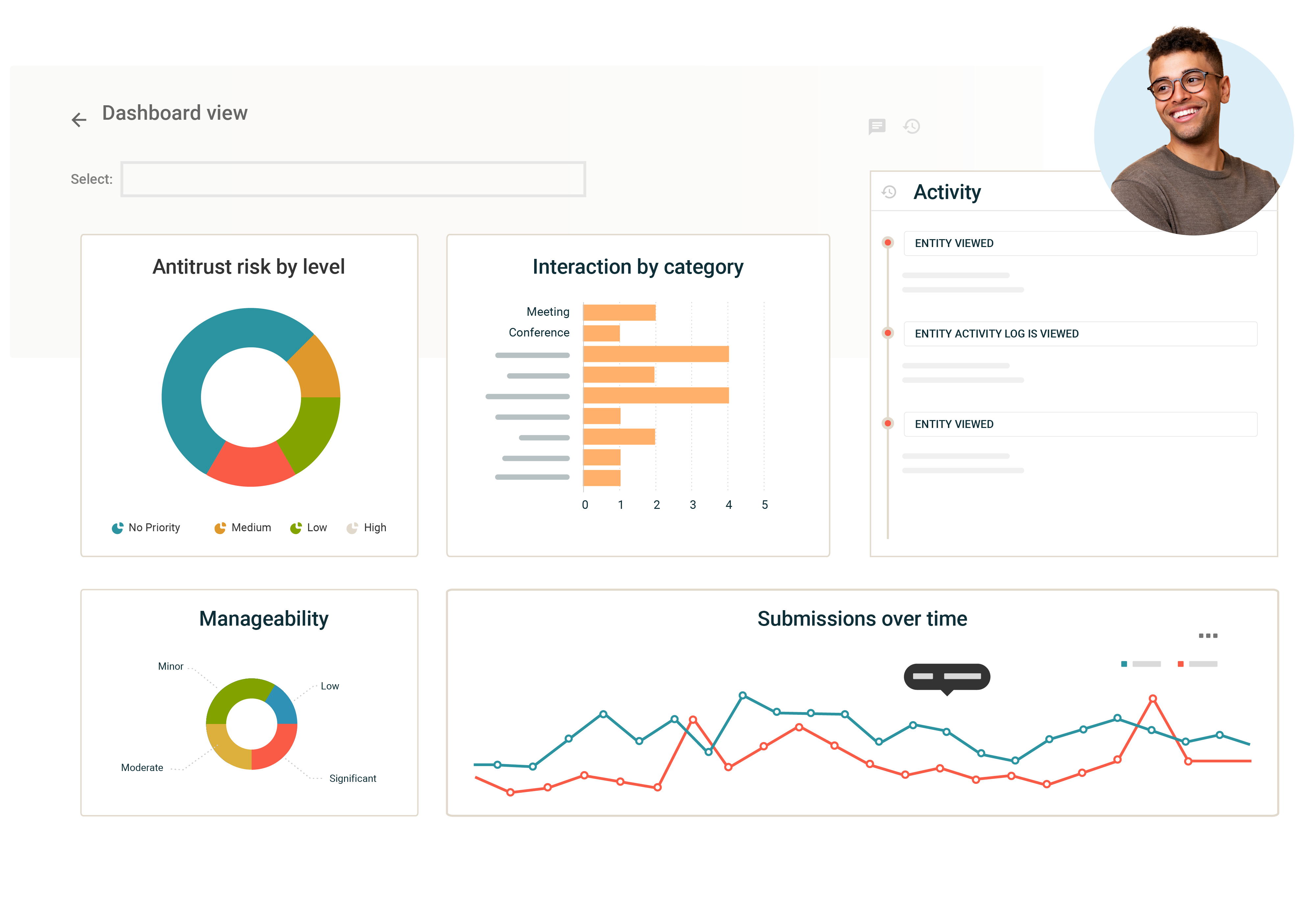Energy & Utility
Energy and Utilities compliance software
Benefit from an integrated, data-driven approach to managing corporate compliance, ethics, and third-party risk – trusted by leading energy and utilities companies. With less effort and more reach, you finally get a better way to do your good work.

Why leading energy and utilities companies rely on GAN Integrity
GAN Integrity is how compliance teams at energy and utilities companies get the tools and expertise to stay ahead of risk. With less effort and more reach, you finally get a better way to do your good work.
See everything – Gain a comprehensive view of overall risk and compliance in one centralized platform for more effective program management.
Adapt to anything – Leverage dynamic workflows and integrations to stay ahead of regulatory changes and evolving program requirements, all without heavy lifting or expense.
Get all the help you need – Receive dedicated support from GAN Integrity’s team of experts.
Compliance challenges for the energy and utilities industry

As a compliance professional in the energy and utilities sector, it can often feel like you’re facing an unfair fight. Navigating a complex web of regulations from agencies such as the EPA and FERC, along with laws like the Clean Air Act and various state regulations, is no easy task.
Energy and utility companies are required to adhere to stringent environmental regulations, manage employee and contractor safety, and protect critical infrastructure from cyber threats. With the growing emphasis on sustainability and renewable energy, monitoring and managing environmental impacts has become more crucial than ever.
In addition to these challenges, building a strong ethical culture and acting with integrity in all business dealings are essential. This includes implementing robust compliance policies and training programs, managing conflicts of interest and gifts and entertainment disclosures, ensuring third parties meet your ethical standards, and continuously monitoring changes in their risk profiles.
Key areas of compliance in energy and utilities
Energy and utilities enterprises are complex organizations with diverse compliance needs, including:
- Environmental Compliance: Adhering to regulations aimed at minimizing the ecological footprint of operations, including air and water quality standards, waste management, and emission controls.
- Health and Safety Regulations: Ensuring compliance with occupational health and safety standards to protect workers from hazards.
- Cybersecurity: Implementing robust measures to protect critical infrastructure from cyber-attacks and comply with regulations like NERC-CIP (North American Electric Reliability Corporation - Critical Infrastructure Protection).
- Data Protection: Safeguarding sensitive information and ensuring compliance with data privacy regulations.
- Sustainability: Adhering to environmental regulations and implementing sustainable practices in energy production and distribution.
- Supply Chain Due Diligence: Ensuring suppliers and partners comply with relevant laws and standards.
- Export Controls: Complying with international trade laws.
- Financial Reporting: Maintaining accuracy and transparency in financial dealings.
- Conflict of Interest Management: Ensuring potential conflicts are disclosed and managed to uphold ethical standards.
- Training: Educating employees about compliance requirements and ethical conduct.
Achieving Compliance in Energy and Utilities Companies: Steps to Success
Achieving compliance in any organization involves a series of strategic steps:
Compliance in the Energy & Utilities Industry
Risk Assessment
Identifying potential compliance risks.
Objective Setting
Defining clear compliance goals.
Documentation
Keeping thorough records of compliance efforts.
Training
Educating employees about compliance requirements.
Monitoring and Auditing
Regularly reviewing compliance status.
Reporting System
Establishing clear channels for reporting issues and disclosures.
Issue Response
Quickly addressing non-compliance issues.
Continuous Improvement
Regularly updating compliance practices.
GAN Integrity for Energy and Utilities Companies
Energy and utilities companies rely on GAN Integrity to navigate these challenges. GAN Integrity’s ethics, compliance, and risk management platform streamlines the compliance process by organizing requirements, automating tasks, and providing up-to-date information on regulatory changes, making it easier for you to do your work. Compliance teams can see everything, adapt to anything, and get all the help they need.
Disclosure Management
Consolidate disclosures for conflicts of interest, gifts, travel, entertainment, and political and charitable donations or contributions. Capabilities include:
- Policy management: Develop and enforce comprehensive disclosure policies. Educate and engage your workforce with targeted training and policy attestations.
- Flexible disclosure process: Simplify the submission of potential conflicts of interest with user-friendly forms, ensuring easy access for employees.
- Automated approvals and reviews: Enhance compliance with automated approval and review workflows. Quickly escalate notifications to relevant stakeholders to address potential risks.
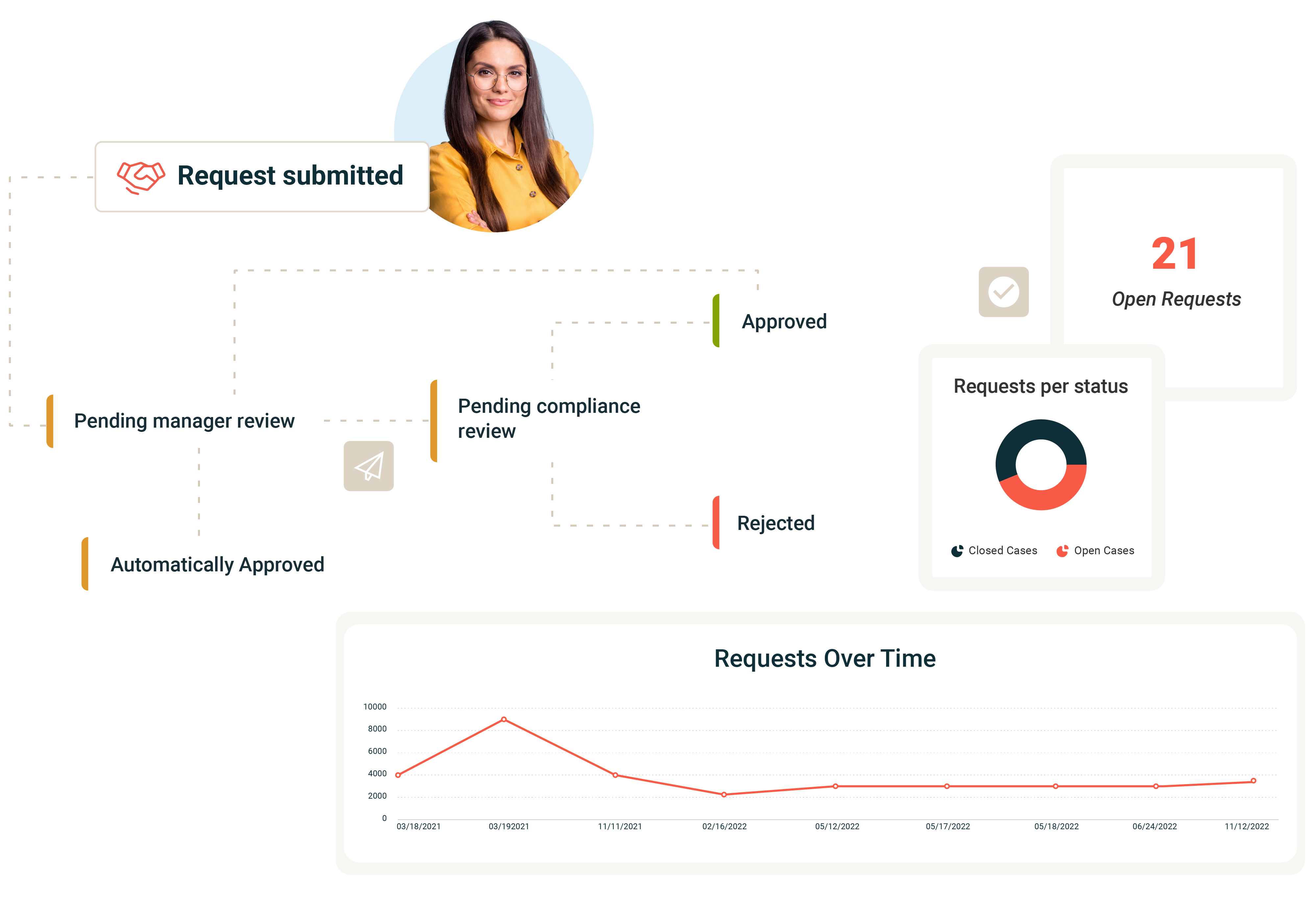
Supply Chain Due Diligence
Enhance supply chain risk management by consolidating processes, identifying and mitigating risks, and integrating data from various risk intelligence and business systems. Capabilities include:
- Automated risk assessments and continuous monitoring: Monitor suppliers continuously for adverse media, sanctions lists, PEP lists, forced labor, and ESG (Environmental, Social, and Governance) issues.
- High-risk supplier identification and management: Identify high-risk suppliers, manage them effectively, and track actions and mitigations to ensure compliance.
- Integrated due diligence assessments: Perform thorough due diligence across your business operations and workflows for seamless integration and enhanced efficiency.
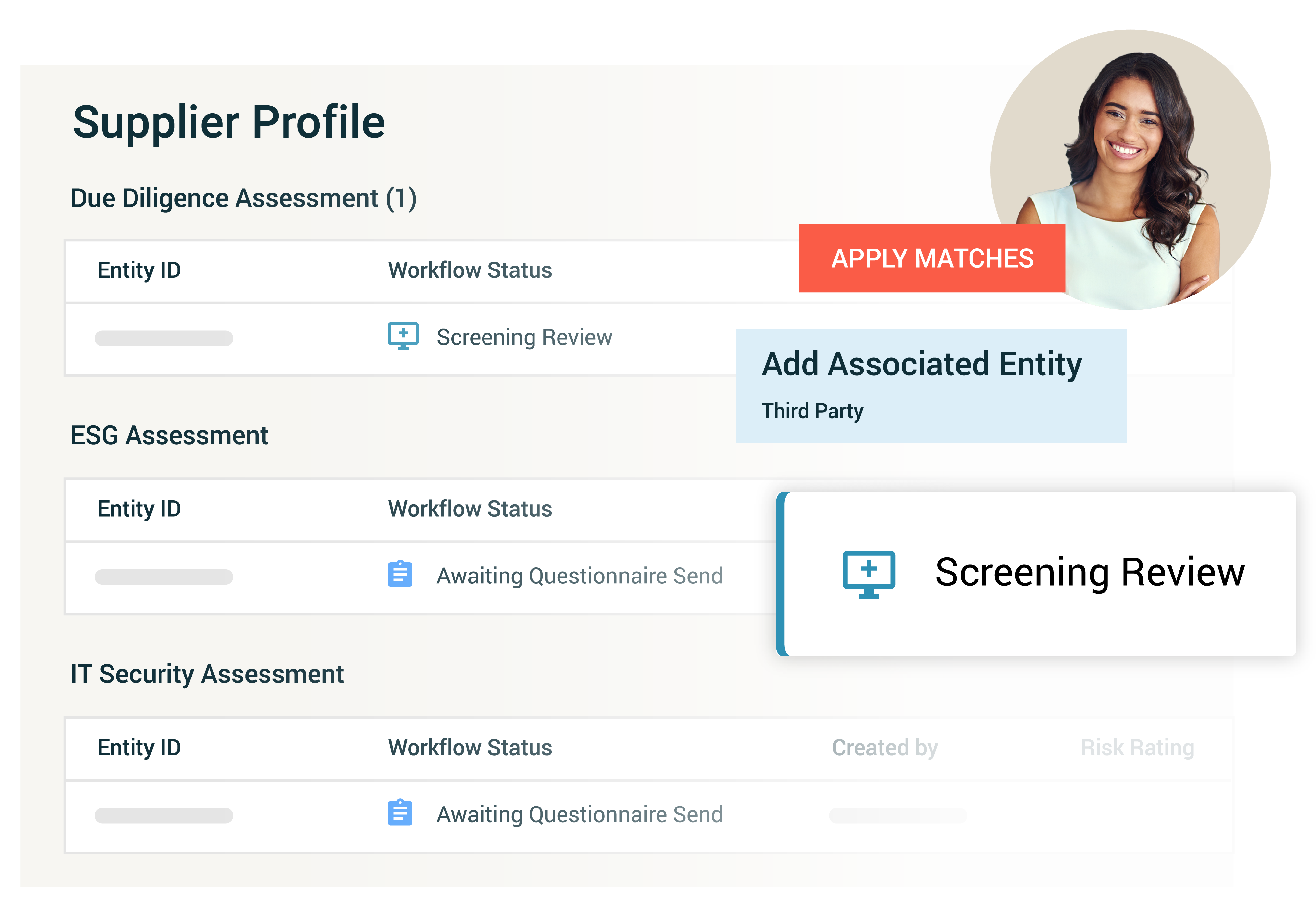
Third-Party Risk Management
Manage risks associated with third parties and assess these against relevant laws and organizational standards. Capabilities include:
- Lifecycle management: Automated workflows for onboarding, risk assessment, issue management, monitoring and off-boarding.
- Integrated due diligence: Initial and ongoing screening of third parties for sanctions, adverse media, forced labor, ESG and more.
- Reporting and analytics: Executive dashboards and reports: Consolidate third party data to identify risks and potential exposure to your organization.
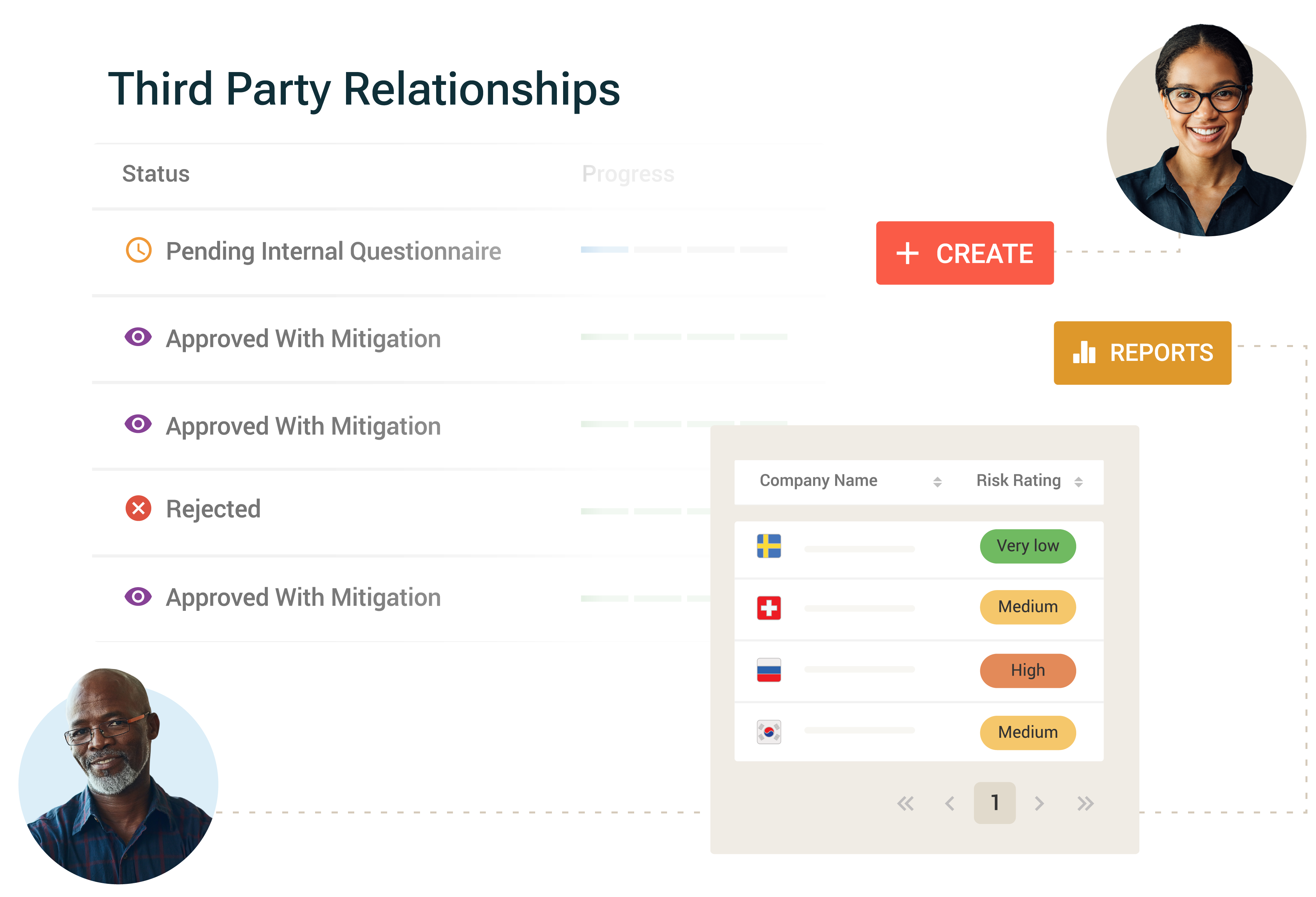
Policy Management
Manage approvals, distribution, and attestation of policies, along with centralized portals for easy access to the latest policies and procedures. Capabilities include:
- Regulatory change management: Identify policies that require updates and timely distribution to employees in response to regulatory changes.
- Automated workflow: Optimize the review and approval process for policies, operating procedures, and work instructions with automated workflows.
- Comprehensive reporting and documentation: Maintain a full audit trail and generate detailed reports to provide clear evidence of compliance to stakeholders and regulators.
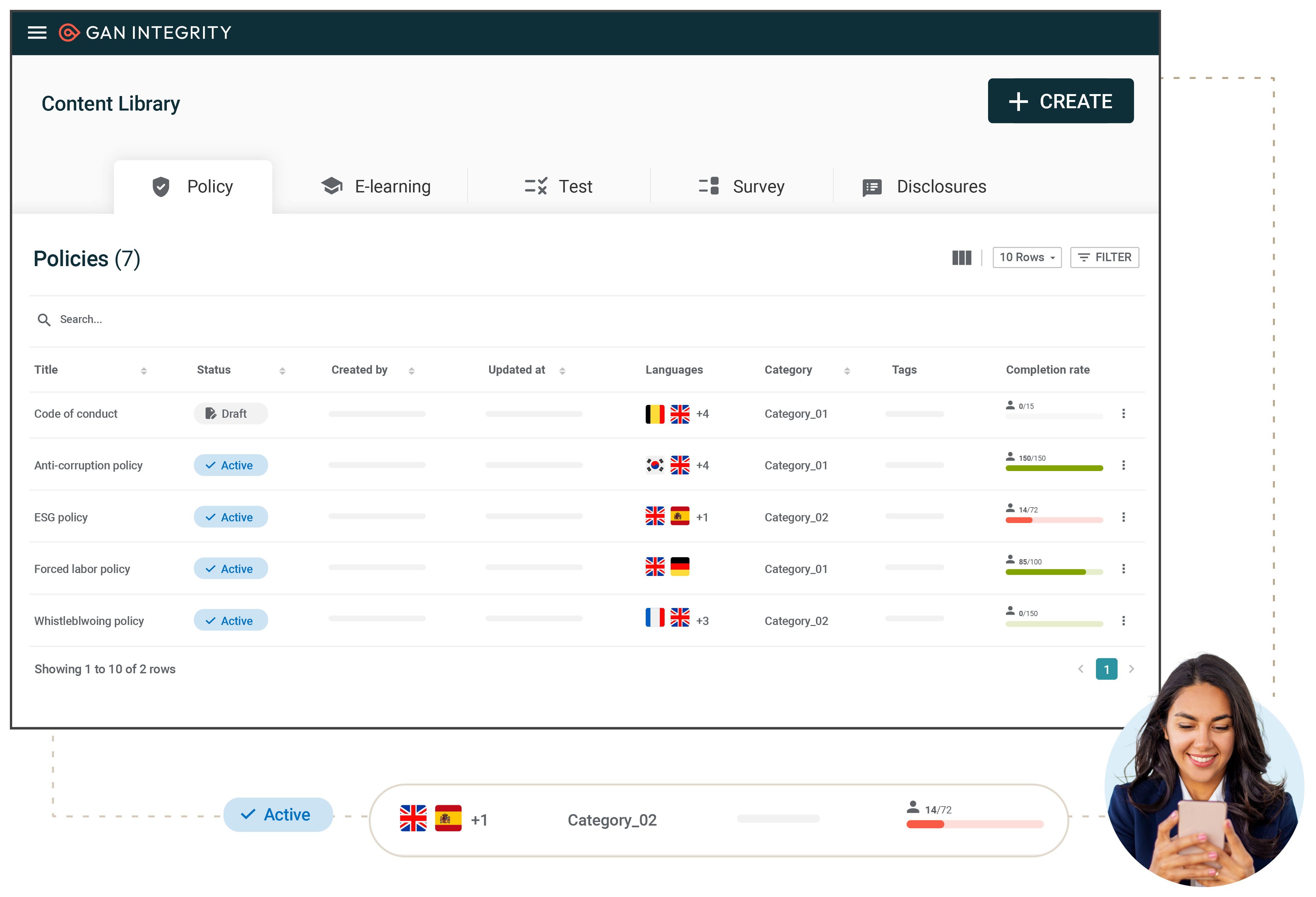
Reporting and Documentation
See everything across your compliance program, and generate reports and dashboards to demonstrate compliance program effectiveness to stakeholders and evidence to regulators. Capabilities include:
- Reporting and analytics: Executive, role-based dashboards to review the effectiveness of your compliance program initiatives.
- Evidence-based compliance: Maintain an auditable trail of all activity with the platform’s integrated and automated audit log.
- Compliance insights: See risk trends and patterns within your program, including third-party and supply chain risk, policies and disclosures.
